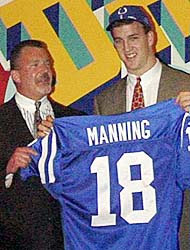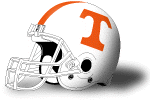

 |
 |
 |
|
INDIANAPOLIS (May 9, 1998) -- It happens to writers every day. Just when you come up with a great idea for an article, something else occurs that gives you another idea for an even better story. And that's just what happened to me this weekend. There I was, seated comfortably before my computer, all ready to compose a 400-line epic poem extolling the virtues of ex-Colt linebacker Trev Alberts (not an easy thing, considering the amount of words that rhyme with "bugeater"). Suddenly, I happened upon a sentence in another article I was reading that stopped me dead in my tracks. The sentence in question is taken from an article in the April 25 online edition of the Anderson Herald-Bulletin. The uncredited article was titled "Manning Finishes Mini-Camp Opener", and it opened with the type of description you'd expect to hear about Manning's first day in a Colts uniform -- with cameramen at the ready, cassette recorders in hand, circling the team's new quarterback like a swarm of bees around a hive. About a third of the way into the column, the writer of the article joked that if Manning had to go to the bathroom during practice, there'd probably be a half-dozen reporters who would have followed him and joined in. Funny enough ... but it was the next sentence that struck a nerve with me: "But that's the price a savior has to pay." Huh? Since when did Peyton Manning suddenly acquire ecumenical status? The last time I looked at Manning's player profile, he graduated from Tennessee with a degree in communications, not miracles. Then again, this sort of thing should be expected by now. It's something that the media does every time they get their hands on the "next" Joe Montana, the "next" Michael Jordan, the "next" Wayne Gretzky, ad infinitum. As someone who gets paid to put his opinions in print, I'm partially responsible for some of that as well. In fact, it was just a couple of weeks ago that I myself said the Colts had a good chance at making the playoffs next season, and I'll stand by that remark. But to label someone as the franchise's savior when he's still four months away from throwing his first professional pass in a real football game ... it's counting your chickens before they hatch; it's putting the cart before the horse; and a few dozen other tired cliches not worth mentioning. So before we get too much ahead of ourselves; before the Indiana legislature passes a resolution to rename the RCA Dome "Peyton's Place"; and before we start refitting the Dome's roof to start hanging all those Super Bowl championship banners we all think the Colts are going to win between now and Manning's retirement, let's take a good, hard look at reality. If the Colts are successful this season, it's true that a large part of the team's success will be due to what Peyton Manning does on the field. There's no underestimating how important having Manning in the backfield is. As the quarterback, he's the one who runs the offense, calling the plays and shouting out audibles if he sees a weakness in the other team's defense. He's the one who has to calm his players down when they get angry or upset. Conversely, he also has to get them fired up if the Colts face a hostile crowd or are in the midst of a tough losing streak. But a team's success or failure does not hinge just on the ability of their quarterback. It takes eleven men functioning as one unit to accomplish their goals on the field. That means a running back coming up to make a block on the safety who's blitzing Manning from his blind side. It means the offensive line giving the quarterback enough time to find an open receiver, or a guard pulling out to provide a key block downfield. It means the receiver breaking down his cover man and getting open for a pass along the sidelines. And while we're at it, let's not forget about the defense and how they factor into a game's outcome. The role they play is just as important: if Manning throws for 4 touchdowns and Marshall Faulk gets 150 yards on the ground, what good is it if the team's defense isn't stopping anyone? If a defensive back comes up and knocks the ball loose, or a linebacker tackles the opponent and stops them from getting a first down, it's just as vital to the team's success as a long completion or 15-yard on offense. Most important, it's about a team working together to achieve victory, and the Colts should know better than most teams about that. Last year, it was backup QB Paul Justin who led the team to its first win of the season over the Packers, a game in which nobody gave the Colts a chance at winning. The year before that, it was a 25-24 win over the Dallas Cowboys, where the Colts won despite having six starters out because of injury. And the entire 1995 season was one big story about a team overcoming adversity and coming together, when only the players and coaches really believed in what they could do. Despite what the critics say, football is the only real "team" sport. In baseball, most of the action takes place between three people -- the pitcher, catcher and batter. Pro basketball has degraded from the high-scoring showtime of the '80s to a series of two-on-two matchups, with the other six guys waiting for something to happen. And hockey, while more of a team sport than the other two, doesn't always include everyone in each play or shift. In football, everybody on the field -- all 22 men -- are involved on the field. Everyone has their assignment; a player to block, a route to run, and so forth. Do your job, and your team stands a better chance of success. Screw it up, and it could cost your team a touchdown -- or worse, a chance at winning. In a few months, Peyton Manning will be one of those 22 men. He'll be a very important part of a powerful offense, and a lot will be riding on his shoulders when the season begins. But for someone who turned 22 a little over a month ago, it's a little early to start proclaiming him as the second coming. Let's at least give him the first half of the season before we begin judging him. It's the only logical thing we can do. Irsay for Pope? If the media wants a real savior, they should look no further than owner Jim Irsay. True, Peyton Manning's the guy who'll decide the team's fate down on the field. Outside the lines, though, it's Irsay who calls the shots, and since taking full control of the team earlier this year, he's moved the Colts out of his father's shadow and into the forefront of pro football. Sure, Irsay could have pulled up stakes and moved to a more high-profile location like Los Angeles if he really wanted to. To some NFL owners, leases aren't even worth the paper they're printed on -- just ask Al Davis and Georgia Frontierre. And yes, there were a number of groups in southern California interested in bringing pro football back to L.A., either by waiting for expansion or buying an existing franchise and moving it. Fox mogul Rupert Murdoch was interested, as was the O'Malley family and Dr. Jerry Buss, the current owner of the Los Angeles Lakers. But Jim Irsay is a rare breed among owners of football teams. Instead of selling out, he balked at any offers that came his way. He's not content with the status quo of some owners who just put any product on the field and line their pockets with television revenues. He's actually concerned about building a dynasty in Indianapolis. That's not something every football fan can say of their own team. In the past three months, Jim Irsay has done more to improve the image of the Indianapolis Colts than his father did since he first brought the team there in 1984. His refusal to give up the team's name and colors to Art Modell, his decision to expand the team's radio coverage and increase ad revenue, his restructuring of the current lease agreement with the city, and his hiring of one of the best football men in the business in Bill Polian are all signs that Jim Irsay knows what he's doing as a football owner. So please, if there's a reason to be grateful right now, it's for having Jim Irsay as an owner. He's a relatively young man with more than a quarter century of experience in the National Football League, from watching his father run the team in the early '70s until he took over sole ownership earlier this year. He's an owner who's had the good judgement to let the people he's hired actually do the work for him. And he's shown loyalty to the city of Indianapolis at a time when most sports owners are looking for the easy dollar. In short -- thanks, Mr. Irsay. You've made us Colts fans proud. |